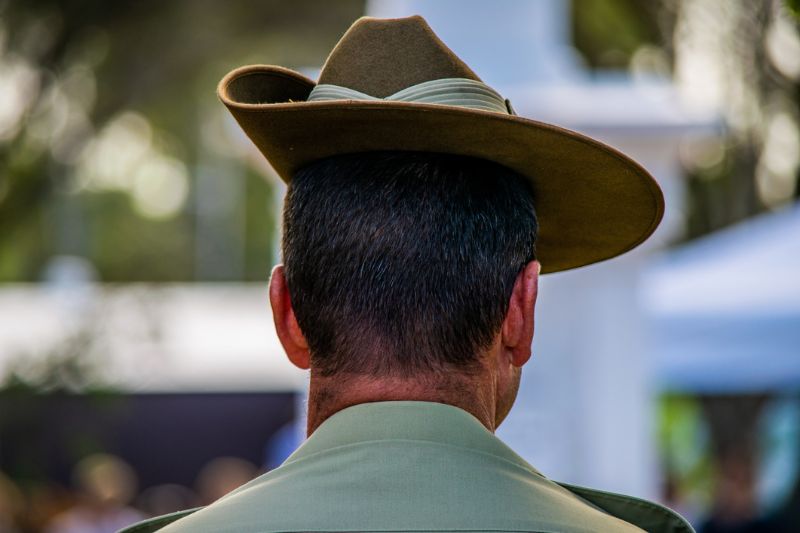Nineteen years ago last month, I was busy sweating bullets up at Kapooka near Wagga; putting one boot in front of the other on the Australian Army’s ceremonial parade ground for a ‘graduation’ parade of newly minted soldiers. In slouch hat and clobber pressed within an inch of its life, I marched around and around, hoping not to trip over my own feet or swing my Austeyr rifle the wrong way at the wrong time. (Thankfully it wasn’t loaded.)

For 45 days of basic, we’d been dragged through disciplines of movement and thought. Repetition and indoctrination. Obedience and initiative.
I wrote at the time, rather vaingloriously, that we had become ‘masters of stillness and blurs of movement’. Certainly, I was fitter, as a then-37-year-old, than I had been since running around the oval at high school.
But surrounded as I was by privates, troopers, musicians and sappers, there was also a sense of pride vying with the relief that I’d get to go home. There was a further nod to an ancestral pull, and a conscious recognition of the propaganda that had me enrolling in the first place.
I was to continue serving in the reserves for a few years more before the demands of parenting caught up with me. As the scion of patriotic, rednecked Queenslanders, both of my grandfathers having served in the Second World War, the act of joining up was more than a second job; it was a rite of passage, perhaps. I’d interviewed and photographed veterans through the course of my journalistic pursuits. I’d marched in brass bands, sang and attended dawn services and Anzac Day events as a child, teenager and adult.
Certainly the enlisting to a cause bigger than myself was a powerful pull; and a welcome physical and mental challenge, as well as presenting as some unfinished business after mucking around with Army cadets at high school.
'As we get closer to Anzac Day, the futility and waste that is war feels heavier. While the value of commemorative days is in honouring the loss, the courage shown and the pain shared in bleak days, the danger as always lies in letting anyone use the dead as propaganda.'
More than that, as an Australian, it was a dive into the Anzac mythos; the often unquestioned and unexamined extolling of courage and sacrifice that was used to hone the national identity and push Australian characteristics through the prism of conflict.
Mateship.
Endurance.
Courage under fire.
Resourcefulness and positivity.
Dogmatic devotion to duty and, at times, a studied ignoring of our military betters; and of military law.
The heavily-punished whistleblowing into dirty deeds done by our warriors and the recent judicial exposure of war crimes with the ensuing reputational damage to Australia’s elite soldiery have led to something of a cultural about turn — we’re faced squarely with the illicit bloodshed that flows despite the Geneva convention and our country’s doctrines and laws of armed conflict.
It has, in all likelihood, always been thus. But previous generations, celebrating Anzac day since 1916, have had reasons to ignore these crimes in the name of Empire and the realpolitik of the day.
The cultural investigation of militarism and the demonisation experienced by Vietnam War veterans in the 70s were an early blip on our nation’s radar. Historian Romain Faithi, writing for The Conversation, noted that during the Covid lockdown in 2020, ‘few took up the call … to commemorate [Anzac Day] in their driveways following the cancellation of official services’.
The waters are rising for the Australian Defence Force, ethically, culturally and logistically. The ADF is reportedly seven per cent under-strength, and has been failing to recruit Australians into its ranks for more than a decade. We have too many boss cockies and too few footsloggers. And we fail to retain military personnel. This is possibly due to poor leadership, bureaucratic inertia (gloriously referred to as ‘the embuggerance of administration’), and a failure to compete with the private sector.
As we get closer to Anzac Day, the futility and waste that is war feels heavier. While the value of commemorative days is in honouring the loss, the courage shown and the pain shared in bleak days, the danger as always lies in letting anyone use the dead as propaganda.
In my meagre experience, I found that many of the training staff — regular troops who were trained in the grisly art of war, some of whom had seen active service — were among the most ardent pacifists I have ever met. That was reassuring.
I think of the bombardier sergeant who, while well versed in blowing people into little bits, excelled at the first aid training we received.
I recall the corporal whose mantra ‘pain is weakness leaving the body’ was balanced with genuine compassion and sensitive ‘man management’ of the men and women he supervised.
The ADF is not yet a lost cause nor a pariah. Australia needs the capacity to defend itself. But young people look at the military and see it as a dead end. Again, as The Conversation suggests, relevance and authentic need is what is missing.
‘If Anzac Day dawn services are to draw large crowds again, they will need to become more relevant. To do so, they could become more inclusive of other demographics and narratives, be less militaristic, and focus on peacekeeping.
‘Recognising the Frontier Wars as part of Australia’s military tradition would also go a long way towards reconciling the nation’s complex past.’
Reconciling the nation’s past.
So, also, would a government with the courage to bring perpetrators of war crimes (committed in our name) to justice; a government with the wisdom to re-define, re-negotiate what it means for an Australian to take up arms in defence of their country; and a government with the balls to articulate why someone would want to do it in the first place.
Barry Gittins is a Melbourne writer.
Main image: (Getty Images)